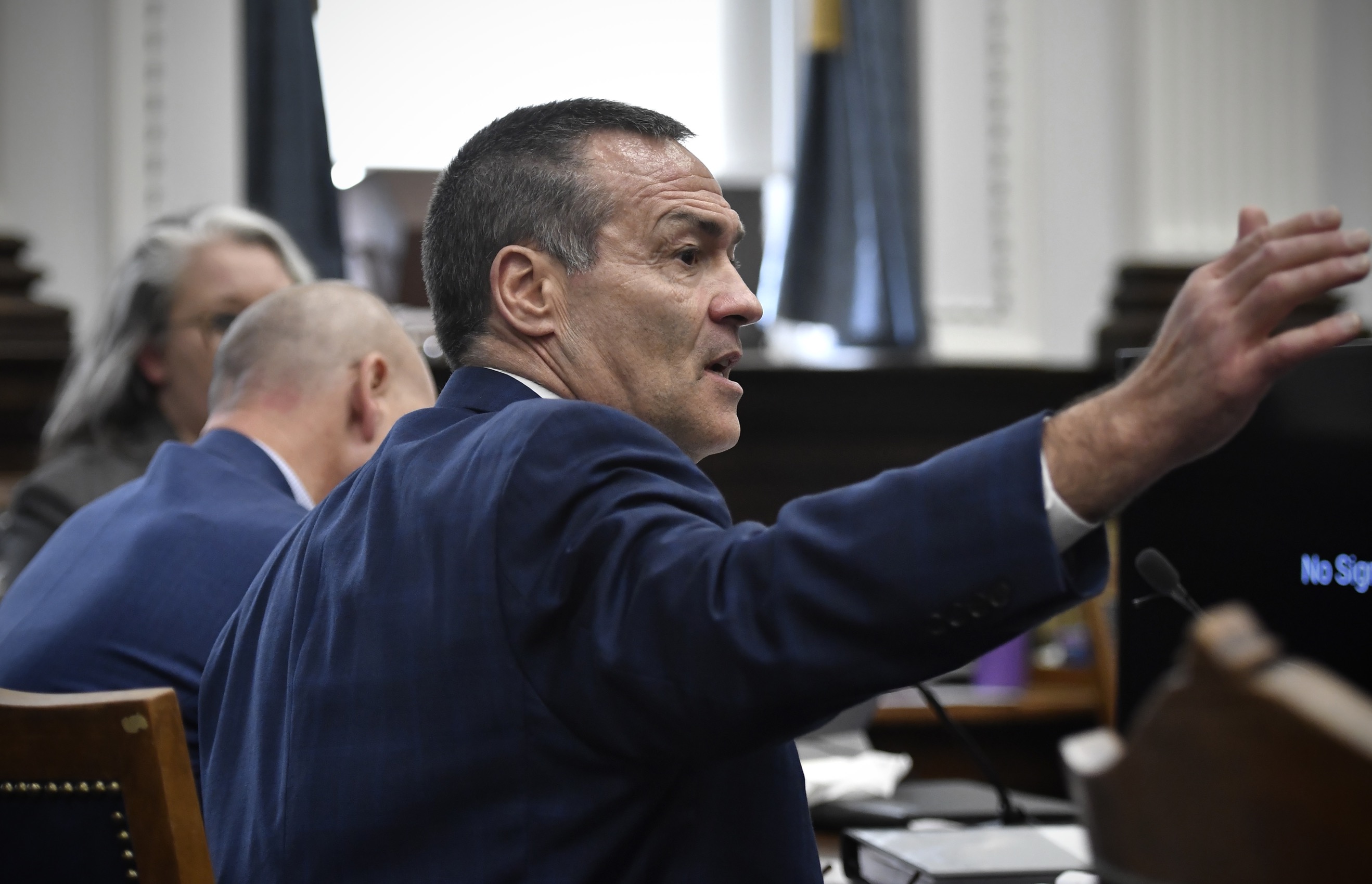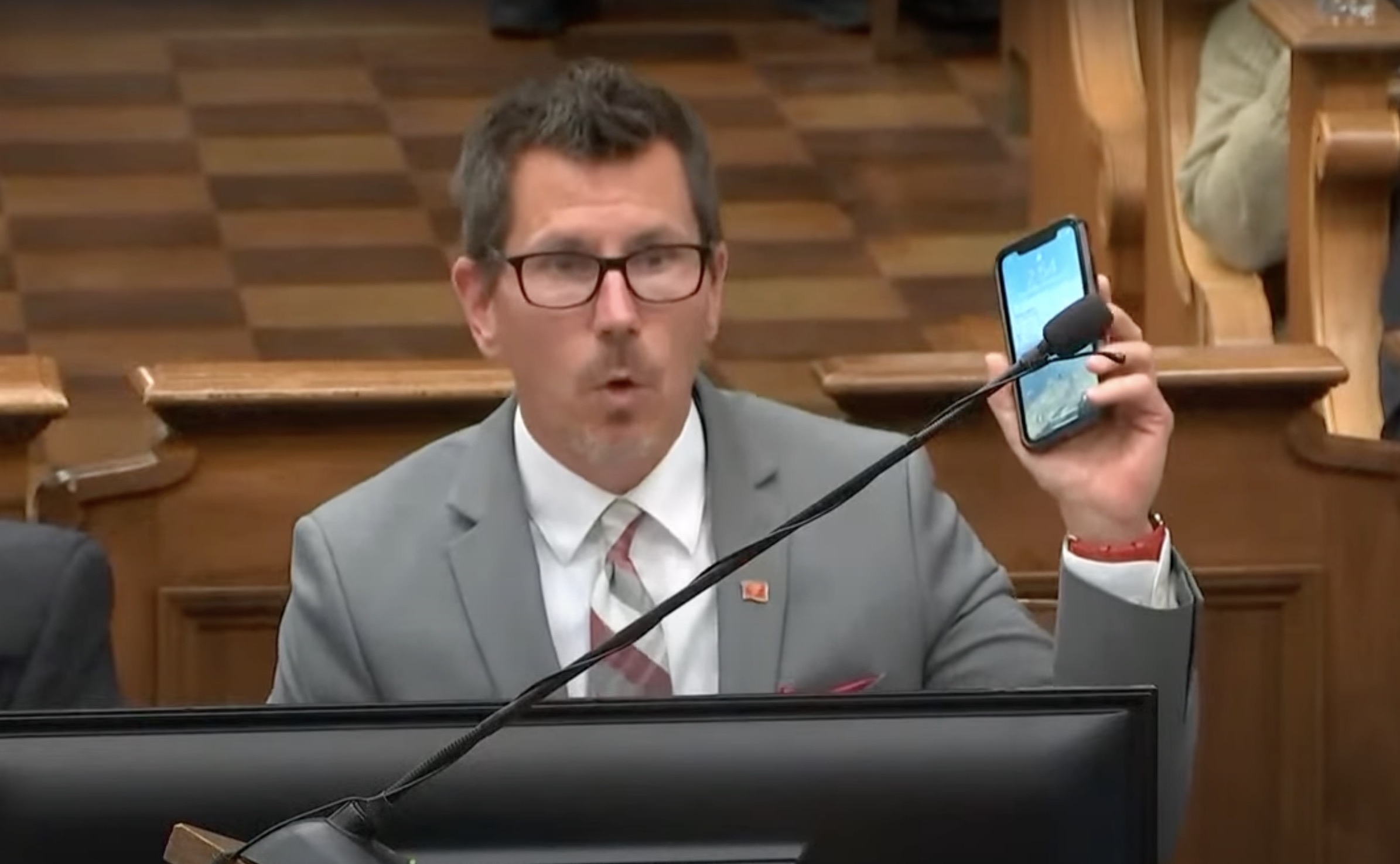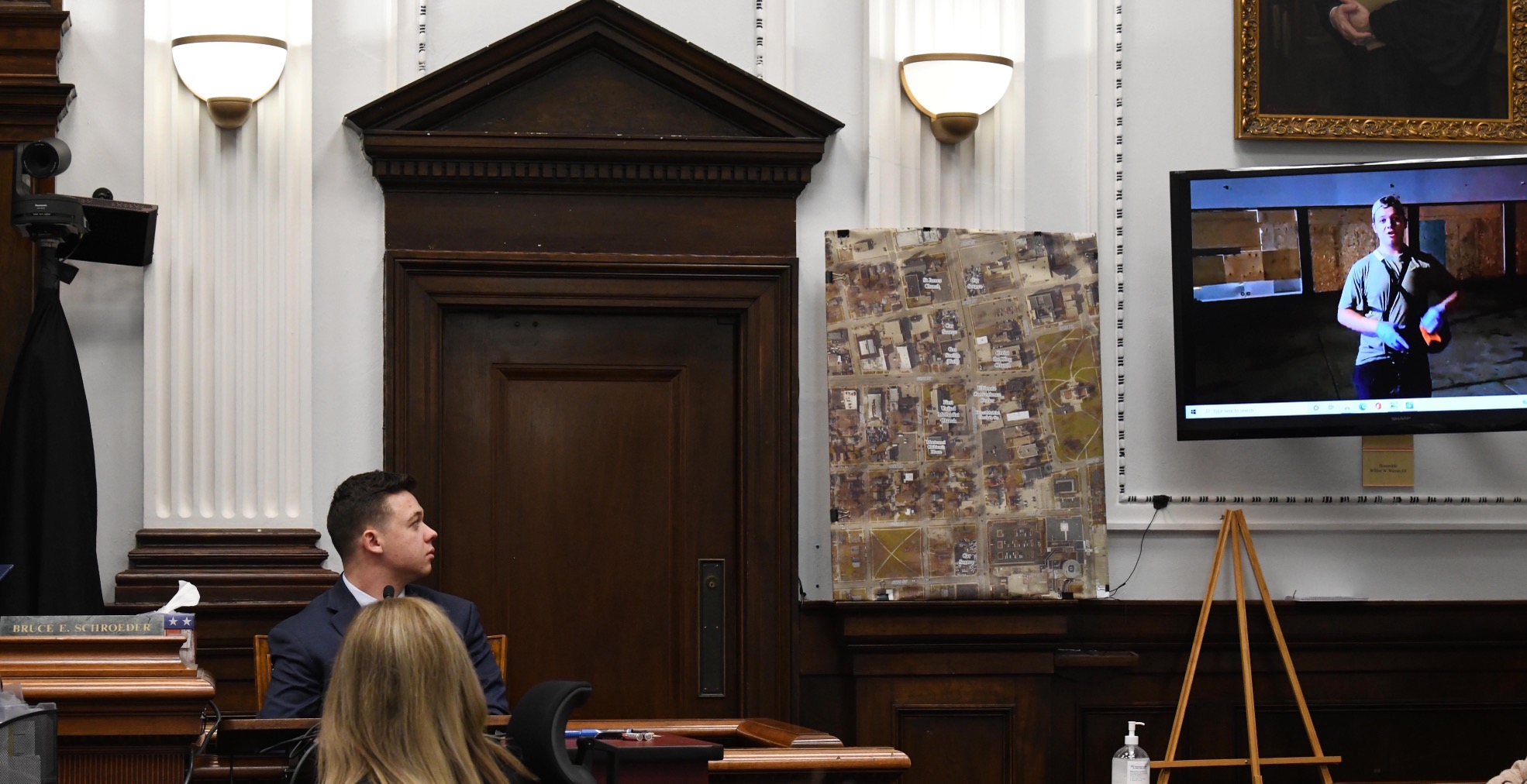
Getty Images | Pool
When Kenosha County prosecutor Thomas Binger cross-examined murder suspect Kyle Rittenhouse yesterday, he wanted to show Rittenhouse video on an iPad and use a touchscreen feature that phone and tablet owners around the world use every day: pinch-to-zoom.
Judge Bruce Schroeder’s ruling? You shall not pinch.
Schroeder prevented Binger from pinching and zooming after Rittenhouse’s defense attorney Mark Richards claimed that when a user zooms in on a video, “Apple’s iPad programming creat[es] what it thinks is there, not what necessarily is there.” Richards provided no evidence for this claim and admitted that he doesn’t understand how the pinch-to-zoom feature works, but the judge decided the burden was on the prosecution to prove that zooming in doesn’t add new images into the video.
When Binger proceeded with his cross-examination, he used a Windows PC connected to a TV instead of an iPad to display drone footage from August 25, 2020, the night of the fatal shootings in Wisconsin. While the TV screen seemed to provide an acceptable alternative to Binger’s preferred method of zooming in on an iPad, Rittenhouse testified that he couldn’t tell what was happening in the video in response to some of the prosecutor’s questions.
You’ve likely already heard about this much-mocked incident at Kenosha County Circuit Court. In this article, you can read lengthy excerpts from the pinch-to-zoom discussion involving lead defense attorney Richards, Assistant District Attorney Binger, and Judge Schroeder. You can also watch this part of the trial on The Washington Post’s YouTube channel. The discussion offers a glimpse into how criminal trials are affected by a judge’s unfamiliarity with technology—even when that technology is a common consumer feature that’s grasped intuitively by millions of people of all ages.
“I don’t think [zooming is] appropriate—it’s wrong”
The exchange began during cross-examination when Binger told Rittenhouse he was going to play the drone video and “use the pinch-and-zoom feature on the iPad to zoom in on the area.” Richards interrupted Binger, saying, “Your honor, I’m going to object to this, and I’d like to be heard outside the presence of the jury.”

Mark Richards, Kyle Rittenhouse’s lead attorney, argues about Assistant District Attorney Thomas Binger’s line of questioning while cross-examining Kyle Rittenhouse on November 10, 2021.
After the jury left, Richards stated his objection:
I don’t know what the state’s going to do next, but I suspect that it’s something along the lines of… they’re going to use the iPad, and Mr. Binger was talking about pinching the screen. iPads, which are made by Apple, have artificial intelligence in them that allow things to be viewed through three dimensions and logarithms.
Richards was apparently trying to say “algorithms.” When asked to repeat himself, he called them “alogarithms” and added, “I don’t understand it all, either.” Richards then claimed that zooming in on an iPad screen adds things that aren’t actually there into an image, and he asked the judge to disallow it:
[The iPad] uses artificial intelligence or their logarithms to create what they believe is happening. So this isn’t actually enhanced video; this is Apple’s iPad programming creating what it thinks is there, not what necessarily is there. And I don’t know what’s going to happen, but we had this video enhanced, we had testimony regarding it, and this is one of the topics that came up. I asked my expert—I said, “Do you know of anything that does something like that?” Because that was when detective [Ben] Antaramian testified about pinching his telephone, and that’s what I was told and that’s where I think this is going, and I don’t think it’s appropriate—it’s wrong.
Prosecutor: Pinch-to-zoom is like a magnifying glass
Kenosha County prosecutor Thomas Binger holds up his iPhone while arguing that pinch-to-zoom should be allowed when showing video during cross-examination in this screenshot from the Washington Post’s livestream.
Binger responded that pretty much everyone who owns a smartphone has zoomed in on photos and videos and understands that doing so doesn’t change the image in any fundamental way:
I think everybody in this room has a smartphone, whether it’s an Apple iPhone or some other device, and I think we’ve all taken a photograph or a video at one point or another and used the pinch-to-zoom feature. This is a common part of everyone’s everyday life. In the olden days, you had a photograph and a magnifying glass, right? That doesn’t change the photograph. When you use a magnifying glass to look at words on a paper or a photograph, the magnifying glass doesn’t change the image. It doesn’t change the pixels on a paper, it doesn’t change the words in the book. All it does is make them easier to see. The pinch-to-zoom feature on the iPad or the iPhone or Android phone—whatever device everyone in this room has—does that exact same thing.
Binger then argued that the burden of proving that zooming should be disallowed is on the defense:
Now if counsel has an expert who will say that this is unreliable or distorting the image or something along those lines—even though this is something everybody in this room has done with countless videos and photos through the last 10 years of our lives here; this is a feature of everyday life in America now with smartphones—if they want to have an expert come in and say it’s unreliable and you can’t believe what’s on that screen, they can do that, and then the jury can make a decision as to whether or not pinching and zooming on an iPad or an iPhone is tampering with the video or altering the image or [is] unreliable or shouldn’t be given any weight. If they want to make a jury question out of this, they are free to do so.
I don’t frankly understand or agree with anything counsel [Richards] just said. I’ve used my phone, I think probably you have, too; this is something within everyone’s common knowledge to pinch and zoom on a screen, and that’s what’s going on here. It does not change the image in any way.
Judge: “I know less than anyone in the room about all of this stuff”

Kyle Rittenhouse watches video of himself from the night of the shootings during cross-examination at the Kenosha County Courthouse on November 10, 2021, in Kenosha, Wisconsin.
Getty Images | Pool
It quickly became clear that Judge Schroeder thought the prosecution must prove that zooming in doesn’t insert new pixels and alter objects in the video.
Schroeder said:
Well, I don’t know. When I put the magnifying glass up, it’s enlarging the image, it is not altering the image. What [the defense attorney is] saying, I think, and I know less than anyone in the room, I’m sure, about all of this stuff, but I’m hearing him to say that they are actually artificially inserting pixels into there, which is altering the object which is being portrayed.
You know what, myself, when confronted with these changes in technology, what I usually do is to admit the evidence but make sure that the finder of fact is aware of the fact that it is not the original image and the method by which it’s been enhanced. You’re suggesting that I should make the defense bring in an expert for it. My thought would be that actually you’re the one who’s offering the exhibit, so you should be in a position to offer evidence as to the fact that it is not distorting the object which is depicted.
Binger protested that the court could simply use “common sense,” but the judge insisted that zooming in on a video could “insert more items.” Schroeder said:
I thought I heard the expert say on the stand, and believe me again, this is not something I’m familiar with, but I thought I heard the expert say that you brought down in from the crime lab that in fact there were alterations made by adding pixels. That’s an alteration of the image. I don’t have any problem with it being received but you’re going to have to have someone testify that it’s a reliable… I don’t want to say “mirror image,” but because obviously if you insert more items into an area of space, it’s going to distort what’s depicted.








